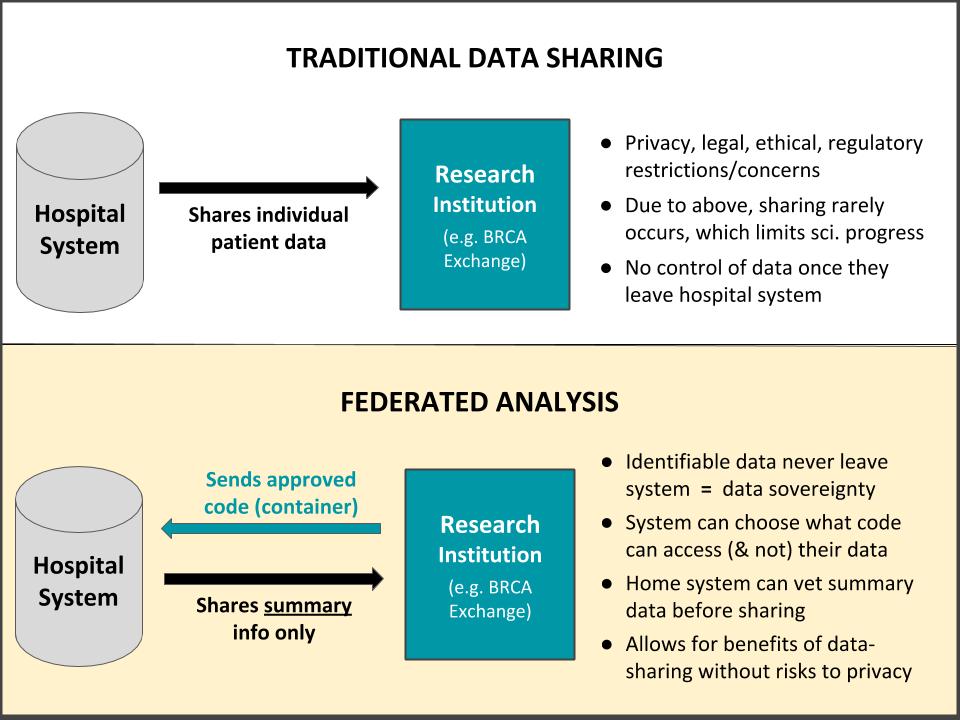Back To Case Studies
Federated Analysis in Cancer Genomics: Surveying the Ethical, Legal, and Regulatory Landscape
By: Melissa Cline
Project Overview
Melissa Cline, Director of the BRCA1 Exchange at the University of California at Santa Cruz, is leading a team to explore the social, ethical, regulatory, and logistical concerns associated with federated data analysis and genomic data sharing from the perspectives of both healthcare data-holding institutions and cancer advocacy organizations and community members. While the goal of the current study is to better understand these perspectives and concerns rather than to establish formal collaborations, the study results will be used to inform BRCA Exchange as it develops a system for analysis of genomic variants associated with inherited cancer risk and may facilitate future collaborations.
What is Federated Analysis?
Federated analysis is a type of data sharing that involves a researcher sending questions (in the form of software) to a dataset rather than an data-holding institution sending patient records to a researcher. What is shared with a researcher is summary information only. This system preserves data sovereignty but allows for the type of data sharing that can benefit patients by increasing knowledge and improving outcomes. Data holding institutions not only vet and test the software to ensure that it does what it is supposed to do but also can audit the results of the analyses before the summary results are sent to the researcher. Figure 1 below illustrates the main differences between traditional data sharing and federated analysis, and summarizes some key elements.
Figure 1. Traditional Data Sharing versus Federated Analysis

Study Aims
The study has two aims. Aim 1 is to explore perspectives and experiences of key experts at two health data-holding institutions with regard to data sharing. Aim 2 is to explore attitudes and experiences of cancer patient communities with regard to participation in research, genetic testing, and sharing of health information, including genetic information.
Methods
For Aim 1, we are conducting interviews with key experts at Geisinger in Pennsylvania and at Southcentral Foundation, a tribal organization in Alaska. We are asking about regulations, protocols, experiences, needs, concerns, and social, ethical, and cultural landscapes related to data sharing. The results of the interviews will help the BRCA Exchange to develop more responsive and innovative federated analysis technologies for future collaborations, ultimately improving our ability to classify variants and prevent disease. We also believe these discussions can be beneficial to the institutions involved by allowing them to explore in detail their data-collection, -governance, and –sharing systems around genomic variants (specifically, in this case, hereditary cancer variants) and where the gaps, strengths, and barriers are, which may allow for internal improvements. These understandings are particularly important in this age of precision medicine when genomic information will play an increasingly large role in patient care. Moreover, participating institutions have the opportunity through this study to help develop a system of data sharing that is responsive to their needs and concerns, improves understandings of hereditary cancer variants, and provides patients with the information they need to make life and death decisions about their health and futures, all while preserving data sovereignty.
For Aim 2, we are conducting interviews and focus groups with patient members and leaders of four cancer communities to better understand patient perspectives and experiences around participation in research, sharing of health information, including genetic information, and barriers to and drivers of participation in genetic testing.
[1] The BRCA Exchange is the largest public source for information on BRCA1 and BRCA2 gene variants and a driver project of the Global Alliance for Genomics and Health. Learn more at brcaexchange.org.